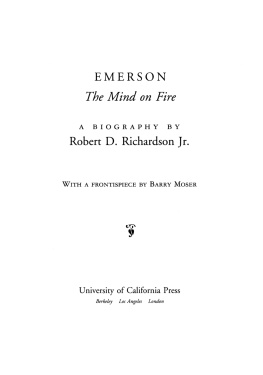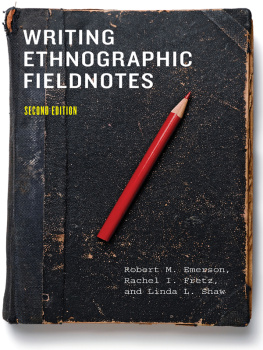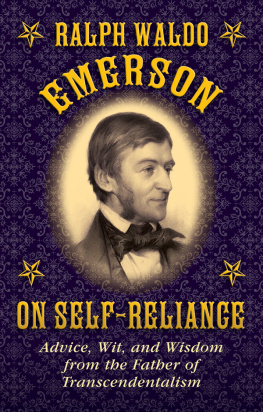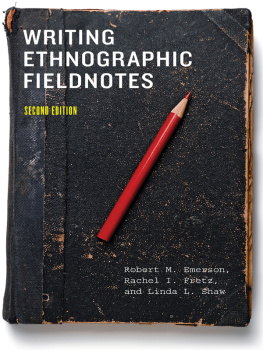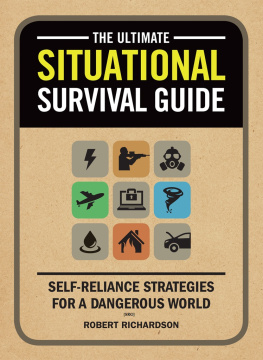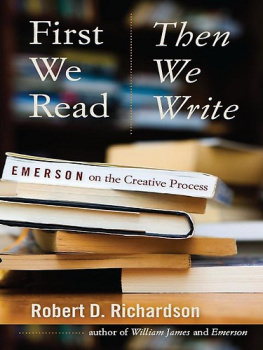Robert D. Richardson Jr. - Emerson: The Mind on Fire
Here you can read online Robert D. Richardson Jr. - Emerson: The Mind on Fire full text of the book (entire story) in english for free. Download pdf and epub, get meaning, cover and reviews about this ebook. year: 2015, publisher: University of California Press, genre: Non-fiction. Description of the work, (preface) as well as reviews are available. Best literature library LitArk.com created for fans of good reading and offers a wide selection of genres:
Romance novel
Science fiction
Adventure
Detective
Science
History
Home and family
Prose
Art
Politics
Computer
Non-fiction
Religion
Business
Children
Humor
Choose a favorite category and find really read worthwhile books. Enjoy immersion in the world of imagination, feel the emotions of the characters or learn something new for yourself, make an fascinating discovery.
- Book:Emerson: The Mind on Fire
- Author:
- Publisher:University of California Press
- Genre:
- Year:2015
- Rating:5 / 5
- Favourites:Add to favourites
- Your mark:
- 100
- 1
- 2
- 3
- 4
- 5
Emerson: The Mind on Fire: summary, description and annotation
We offer to read an annotation, description, summary or preface (depends on what the author of the book "Emerson: The Mind on Fire" wrote himself). If you haven't found the necessary information about the book — write in the comments, we will try to find it.
Emerson: The Mind on Fire — read online for free the complete book (whole text) full work
Below is the text of the book, divided by pages. System saving the place of the last page read, allows you to conveniently read the book "Emerson: The Mind on Fire" online for free, without having to search again every time where you left off. Put a bookmark, and you can go to the page where you finished reading at any time.
Font size:
Interval:
Bookmark:


The Mind on Fire
Robert D. Richardson Jr.

University of California Press
Berkeley Los Angeles London
The publisher wishes to acknowledge with gratitude the generous supportof the National Endowment of the Humanities.
University of California Press
Berkeley and Los Angeles, California
University of California Press, Ltd.
London, England
Copyright 1995 by The Regents of the University of California
Library of Congress Cataloging-in-Publication Data
PS1631.R53 1995
814'.3dc20
CIP
FOR ANNIE,
who also knows the days to be gods


THIS BOOK WAS ORIGINALLY PLANNED AS AN INTELLECTUALbiography, a companion piece to Henry Thoreau: A Life of the Mind (1986).My approach to both Thoreau and Emerson has been to read what they readand then to relate their reading to their writing. The story, howeverandit is a storyof Emersons intellectual odyssey turned out to beincomprehensible apart from his personal and social life. The result is an intellectualbiography as well as a portrait of the whole man. A great deal of newlyavailable material (the letters of Emersons brothers, of his aunt Mary MoodyEmerson, and of his friend Caroline Sturgis, for example) has brought tolight an Emerson strikingly more lively than the plaster sage of Concord.
Emerson lived for ideas, but he did so with the reckless, headlong ardorof a lover. He associated the human mind and its capacity for thought withactivity and energy. He hated the passive notion of the mind as a blank slate.He concentrated instead on the individuals sources of power, on access tothe central fires that ignite the mind. His main image of the creative mindis of a volcano. We must have not only hydrogen in balloons and steelsprings under coaches, he wrote, but we must have fire under the Andesat the core of the world.
Freed of his vast, unfortunate, and self-perpetuating reputation, Emersonsteps forth as a complicated, energetic, and emotionally intense man whohabitually spoke against the status quo and in favor of whatever was wildand free. The great spokesman for individualism and self-reliance turns outto have been a good neighbor, an activist citizen, a fond father, a loyalbrother, and a man whose many friendships framed his life. Emersons mainproject, never realized to his satisfaction, was to write a natural history ofintellect; I have tried to honor this aim by reconstructing the natural historyof his enthusiasms.
Biographies of Emerson appear at regular intervals because his life andworklike Jeffersons and Lincolnscontinue to shape Americanself-perception. Emerson never wrote for groups or classes or institutions; hisintended audience was always the single hearer or reader. Where thisbiography parts company with its many worthy predecessors is in its lackof interest in institutional Emersonianismin Emersons influenceandin its concentration instead on the man. What kind of individual was thisprophet of individualism?
I have had a great deal of help with this project. Many scholarly and criticaldebts are recorded in the notes. I wish also to thank, for their variousservices, the Ralph Waldo Emerson Association, Chris Steele of theMassachusetts Historical Society Library, the Society for the Preservation ofNew England Antiquities, David Wood of the Concord Museum, MarciaMoss of the Concord Free Public Library, the Thoreau Lyceum, theBoston Athenaeum, the Houghton Library at Harvard, the Boston Museum ofFine Arts, Liz Gwillam and Paul OPecko of Mystic Seaport, ElizabethSwaim, curator of Special Collections, and Joan Jurale, reference librarianat Wesleyan University, Tina Furtado and the New Bedford Free PublicLibrary, and Michael Preston, who is continuing work on Eugene Ireysmammoth computerized concordance to Emerson. Zhou Guangyuan,Beth Marsh, Gayle Smith, and Ida Walters taught me as students. Forvarious kinds of aid and support, cheerfully given, I am also grateful toSusan Bardens, W. J. Bate, Delores Bird Carpenter, Victor Castellani,Gary Collison, Rebecca Frazier, Greg Gatenby, Joan Goodwin, VictorGourevitch, Robert Gross, Philip Gura, Justin Kaplan, Phyllis Rose, DavidSchorr, and Paul Schwaber. Eleanor M. Tilton let me see typescripts of hernew volumes of Emerson letters. Bob Burkholder shared his incomparableknowledge of Emerson bibliography. Al von Frank let me see typescripts ofthe new edition of Emersons sermons. George Goodspeed let me read hiscollection of unpublished Emerson family letters. For help with identifyingand reproducing photographs I am deeply indebted to the advice andexpertise of Harry Orth and Daniel Jones.
No one can mention, let alone repay, all the intellectual debts oneaccumulates during an eight-year project. Roscoe Hill helped me with Plato,Phyllis Cole with the difficult and fascinating Mary Moody Emerson,Megan Marshall with Elizabeth Peabody. To Jere Surber I owe whatevergrasp of German idealist thought I have. Burton Feldman and AllenMandelbaum have kindly attended to my continuing education in too manyareas to list; so have my daughters, Anne and Lissa. Stanley Holwitz has beena steady source of encouragement. The John Simon GuggenheimFoundation gave me a years support, a very great boon, which came at just theright time.
Joel Myerson, the dean of American transcendentalist scholars, made anextraordinary contribution. With the generosity for which he is famous, heturned over to me several thousand pages of transcripts he had made of theletters and other writings of Emersons brothers Charles, Edward, andWilliam. This material has made possible a new level of understanding ofthe Emerson family. Joel also gave my entire manuscript a searching andprofoundly helpful reading. Larry Buell, Annie Dillard, Amanda ClarkFrost, and David Robinson also read the book in manuscript. I have profitedfrom the incomparable knowledge of each; remaining lapses and gaffes are,of course, exclusively mine. The dedication inadequately records my greatestdebt of all.
We measure ourselves by many standards. Our strengthand our intelligence, our wealth and even our good luck,are things which warm our heart and make us feelourselves a match for life. But deeper than all suchthings and able to suffice unto itself without them,is the sense of the amount of effort we canput forth... He who can make none is but a shadow; hewho can make much is a hero.
William James

Emerson at 43.
(Original in Carlyle home in London; photo bypermission of Concord Free Public Library.)
Font size:
Interval:
Bookmark:
Similar books «Emerson: The Mind on Fire»
Look at similar books to Emerson: The Mind on Fire. We have selected literature similar in name and meaning in the hope of providing readers with more options to find new, interesting, not yet read works.
Discussion, reviews of the book Emerson: The Mind on Fire and just readers' own opinions. Leave your comments, write what you think about the work, its meaning or the main characters. Specify what exactly you liked and what you didn't like, and why you think so.

